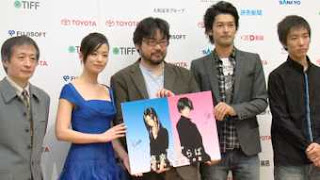 Designer Death
Designer DeathIt's pretty amazing how a small film with essentially a two-man cast set predominantly in a stank toilet, could eventually spawn a franchise lasting 6 movies long now, and a contemporary cult anti-hero with Jigsaw and Tobin Bell the actor joining the hall of horror infamy. And what more too with the villain quite clearly not doing any killing himself, but does so indirectly through some mad scientist manner in creating ingenious contraptions that get audiences lapping up for more.
One may add that Saw VI does feel like flogging a dead horse, since we know what happened to Jigsaw already in the past few films, but this installment pretty much showed that there's still one last fight left in ol' Jigsaw, which I hope will be its last outing because it pretty much wrapped up everything nicely. Unless of course you choose to interpret its finale as an open one.
What I thoroughly enjoyed about Saw VI, is how it steered clear of being a parody of itself, or a flick out to exploit with a weak story. Here, the screenplay by Marcus Dunstan and Patrick Melton infused some contemporariness in having a social aspect inserted. Instead of bumping off corrupt cops, drug addicts or folks who seem to live life for granted, they've added the unscrupulous characters from the healthcare insurance workers, whose flawed reasoning of probability turned away folks who are in need of help, and are in dire straits of treatment being denied unto them.
Hiding behind "policy", they disengage without empathy and for selfish, personal gains, just like the protagonist in Sam Raimi's Drag Me to Hell. So it was somewhat a guilt trip in watching how these folks get their just deserts, and not to mention those lawyers who are lacking in morales of course, lending their expertise to ensure maximum profits. Amongst the victims here, while most show their true colours when faced with death, the lawyer is probably the one who will get your utter most attention, and chuckle too, for the behaviour exhibited.
Granted there are less bizarre killings and contraptions here compared to its predecessors, but that doesn't mean that as a standalone film, your goosebumps won't stand. Starting with a bang, the simplest device involving a carousel, ended up the most gripping of the lot, where hard decisions have to be made in a race against time and pain, amidst plenty of accusations and revelations flying. Probably one of the less flashy Jigsaw designed death method, but one clearly the most horrendous of the lot.
Saw VI follows the usual formula in explaining Jigsaw's rationale and methods, and the valuation of life which tie in pretty well with most of the earlier films, with the given twists at the end that helped to elevate this worthy as a "Saw" film, complete with double crossings that just beg for you to re-watch the earlier films. As I mentioned, it's a fitting finale to a long-running series, and I'd wish they stop now before the idea gets too stale, and subsequent effort really coming off as too trying and contrived. In other words, retire gracefully now while at the top of its game as the mother of all torture porn franchises.
Click here for reviews of Saw I, Saw II, Saw III, Saw IV, Saw V

 God's Gift to Women
God's Gift to Women
 Love
Love Band Members
Band Members Sisters
Sisters King of Pop
King of Pop The Lonely, Dangerous Road Ahead
The Lonely, Dangerous Road Ahead
 Was It The Son With The Violin In The Study?
Was It The Son With The Violin In The Study? Big Bird Running
Big Bird Running
 This is a Private Flight!
This is a Private Flight! Worlds Apart
Worlds Apart LtoR: Li Fangfang, Huang Ming, Liu Dong and the producer whose name I didn't get as no questions went his way!
LtoR: Li Fangfang, Huang Ming, Liu Dong and the producer whose name I didn't get as no questions went his way!
 We're On Your Side
We're On Your Side Standing Proud
Standing Proud LtoR: Director Haruki Kadokawa, Hiroyuki Miyasako, Nao Omori, Yasuko Matsuyuki and Novelist Jo Suzuki
LtoR: Director Haruki Kadokawa, Hiroyuki Miyasako, Nao Omori, Yasuko Matsuyuki and Novelist Jo Suzuki
 LtoR: Producer Kazuyoshi Okuyama, Machiko Ono, Cartoonist Tatsuya Egawa, Masashi Kubota, Director Kite Okachimachi
LtoR: Producer Kazuyoshi Okuyama, Machiko Ono, Cartoonist Tatsuya Egawa, Masashi Kubota, Director Kite Okachimachi Mr Lonely
Mr Lonely